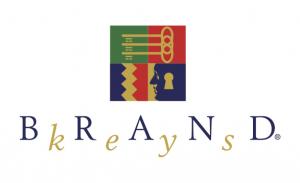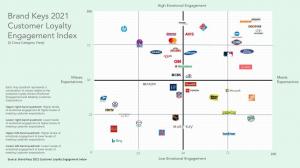Loyalty's Cure For COVID Pandemic
Brands That Pass With A+ Include Apple, Discover, Disney+, Amazon, Hyundai, Fox News, Avis, Clorox, Konica-Minolta, State Farm, Dunkin’, Utz, MSNBC, & Delta
The Ultimate Loyalty Stress-Test
“The new CLEI survey found 2020 marketplace rigors created two loyalty challenges for brands,” noted Robert Passikoff, Brand Keys founder and president. “First, how to enhance brand-to-consumer emotional engagement and, second, how to leverage brand values to best meet customers’ expectations.”
Loyalty Treasure Map
The 2021 CLEI examined 94 categories and 855 brands. This year, to graphically illustrate brand loyalty rankings, Brand Keys created a series of emotional engagement/expectation quadrant maps to delineate brand loyalty positions in the marketplace based on the two stress-test dynamics. Each quadrant on the map represents a combination of values related to predictive loyalty drivers: Emotional Engagement and Meeting Customer Expectations.
“Ideally,” said Passikoff, “You want consumers to feel your brand engenders high emotional engagement and meets their expectations as completely as possible. Brands able to do that are six times more likely to create loyal customers, and loyal customers are six times more likely to give a brand the benefit of the doubt in tough circumstances.” Brands representative of each of the four quadrants of this year's loyalty map included:
Quadrant #1: HIGH EMOTIONAL ENGAGEMENT & HIGH LEVEL OF MEETING EXPECTATIONS:
Apple, Dunkin’, Amazon, Fox News, Avis, Clorox, Disney+, Google, Hyundai, JetBlue, American Express, Konica-Minolta, Samsung, Discover, Delta, Guinness, Major League Baseball, Baskin Robbins, Jack Daniels, MSNBC, Zara, Utz, Clorox, TikTok, Corona Light, Ford, Pepsi, & TD Bank
Quadrant #2: LOW EMOTIONAL ENGAGEMENT & HIGH LEVEL OF MEETING EXPECTATIONS:
Campbell’s, Macy’s, Toyota, Burger King, Capital One, Microsoft, Facetime, Home Depot, Apple Pay, Poland Spring, Coors, 7th Generation, Zoom, Microsoft, Twitter, MetLife, Gillette, & Coke
Quadrant #3: HIGH EMOTIONAL ENGAGEMENT & LOW LEVEL OF MEETING EXPECTATIONS:
HP, Old Navy, Papa John’s, Taco Bell, Mastercard, GEICO, Old Navy, Amstel Light, Taco Bell, CBS, Allstate, Mr. Clean, CNN, GEICO, CBS, Lyft, Orbitz, & Old Navy, Whit Castle, & Axe
Quadrant #4: LOW EMOTIONAL ENGAGEMENT & LOW LEVEL OF MEETING EXPECTATIONS:
Revlon, Bing, Wells Fargo, Motel 6, Mazda, Victoria’s Secret, Pizza Hut, Nook, Diet Coke, Budweiser, National Hockey League, USPS, Subway, J. Crew, Victoria’s Secret, Aim, Dasani, Chrysler, Hertz, GAP, Alpo, Under Armour, Bank of America, Citgo, & Payless
For more information about a specific category or sector, or specific brand rankings, please contact Leigh Benatar at leighb@brandkeys.com
Customer Desire and Brand Delivery
“Emotional engagement, the result of effective marketing communications that increases a brand’s equity, results in customers behaving more positively toward the brand,” noted Passikoff. “Consumer expectations, a key dimension of customers’ brand belief-systems, are unconstrained customer desires. Expectations increase on average 22 percent a year, yet brands typically manage to achieve only a seven percent increase – a big gap between customer desires and brand delivery.
Broken Supply-Chains = Lack of Availability, Not A Lack of Loyalty
“Desperate times calls for desperate choices due to lack of product availability, and purchase of ‘new’ or ‘alternative’ brands represents basic need, not a lack of customer loyalty. During pandemics consumers will compromise, but they still continue to demand that their expectations be met,” noted Passikoff. “But lack of product availability does not denote a decline of brand loyalty. Yes, being in-stock matters as regards sales, but loyal customers are more likely to stick with their favorite brands through difficult times and, in a more stable marketplace, will wait for them or will actively seek them out.”
“What’s incontrovertible is that the 2021 Customer Loyalty Engagement Index confirms brands that best meet consumers’ expectations, and are capable of creating and sustaining emotionally engaging relationships, always see enhanced loyalty – and the market share and profits that come with it,” added Passikoff. "Always."
A complete list of the 94 categories in the 2021 Customer Loyalty Engagement Index and the brands exhibiting the highest loyalty focus via emotionally engaged customers and an ability to better meet customer expectations can also be found on the Brand Keys website.
Methodology
For the 2021 CLEI survey, 75,804 consumers, 16 to 65 years of age from the nine US Census Regions, self-selected categories in which they are consumers and brands for which they are customers. This year Brand Keys examined 94 categories and 855 brands. Forty (40%) percent were interviewed by phone and sixty (60%) percent were interviewed online. Brand Keys uses an independently-validated research methodology that fuses emotional and rational aspects of the categories.
This year Brand Keys organized brand loyalty standings via emotional-expectation loyalty mapping to identify where brand-specific loyalties fall, help visualize loyalty decision-paths, and clarify brand positions in the marketplace. Consisting of two axes, one representing the degree of emotional engagement a brand engenders and the second, a measure of the brand’s ability to meet customer expectations, allowing brands to focus marketing efforts to better manage loyalty and competitive challenges.
Brand Keys’ research technique, a combination of psychological inquiry and statistical analyses, has a test/re-test reliability of 0.93 and produces results generalizable at the 95% confidence level. Brand Keys loyalty assessments correlate with positive consumer behavior in the marketplace at the 0.80+ level and have been successfully used in B2B, B2C, and D2C categories in 35 countries.
Robert K Passikoff
Brand Keys, Inc.
+1 212-532-6028
robertp@brandkeys.com
Legal Disclaimer:
EIN Presswire provides this news content "as is" without warranty of any kind. We do not accept any responsibility or liability for the accuracy, content, images, videos, licenses, completeness, legality, or reliability of the information contained in this article. If you have any complaints or copyright issues related to this article, kindly contact the author above.


